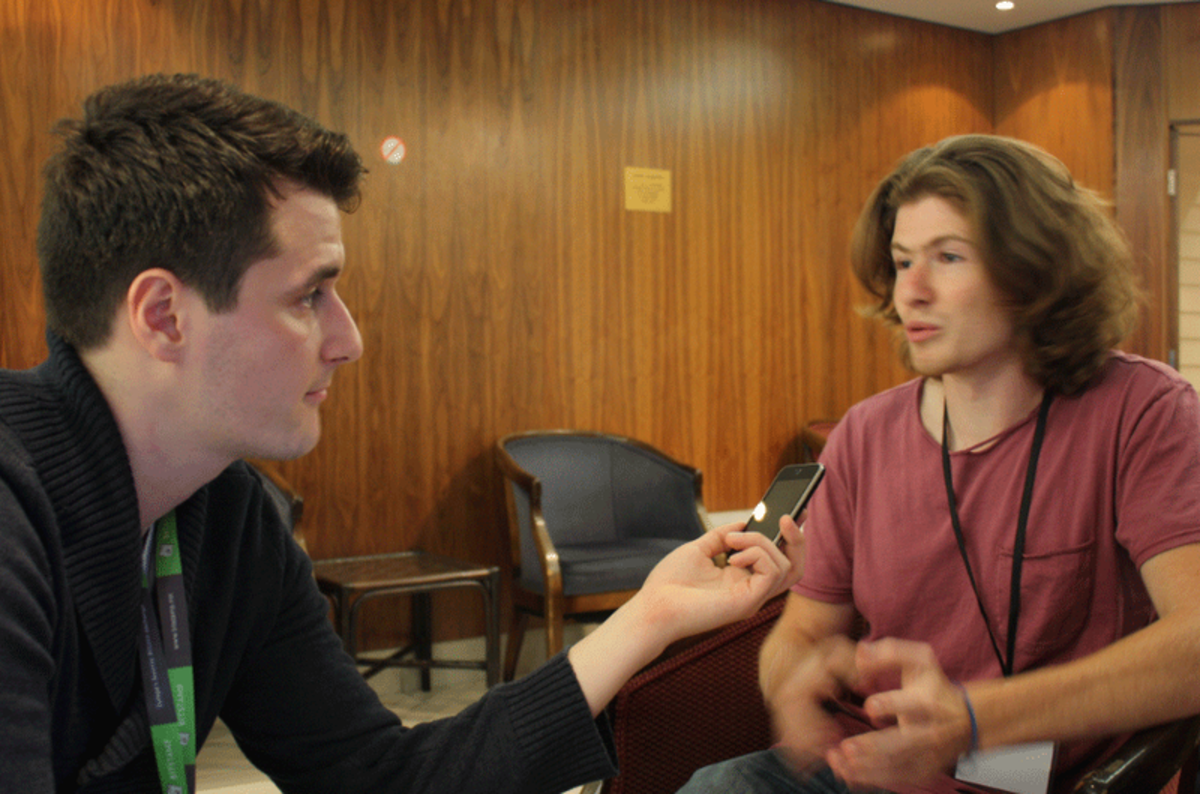
Attention on Bitcoin has increased considerably in 2012 based on a number of sources. Although the Google Trends volume, a rough indicator of the number of eyeballs looking for something on the internet, is not nearly as high as it was at its all-time high in June 2011, indicators of the slower-paced and more durable sort of attention that ultimately leads to success for any new product of technology have arguably only become stronger. In 2011, indicators that there was any high-level institutional acceptance of the technology were scant, and any kind of connection between an established government or business and Bitcoin, even an independent time project of a Google employee, became the focus of attention for weeks.
There are good reasons to be concerned about this kind of institutional attention; even if it has little effect on Bitcoin directly, there is reason to believe that many businesses are holding out on accepting Bitcoin because they are waiting for official acceptance. BitPay’s Tony Gallippi writes about the experiences of Bitcoin users in Finland: “As a result of the secretary of the Central Bank of Finland publicizing that bitcoin is legal to use in Finland, many businesses have seized the opportunity to accept bitcoin. Some of the rather unique merchants in Finland include a dentist office, a veggie burger restaurant chain, and a funeral service.” There are likely many potential Bitcoin-using businesses in the US and elsewhere that are holding out for just such a ruling; in the case of Google, Sergey Brin all but admitted that that was the case. Since 2011, however, there have been many telltale signs that there are a number of individuals and teams in the upper echelons of government and business around the world that have begun to pay attention to what the mainstream media still, arguably correctly, describe as a fledgling currency, and this article will list some of the more important indicators.
- Bitcoins are a Unit of Value in Germany – Germany’s financial supervisory authority, Bafin, has published a report (translation of relevant text here) delineating their status under German law. The document has the following to state on the subject: “tokens of value meant to be used as a method of payment which are issued by barter-clubs, private exchange-rings or other payment systems in exchange for real economic goods or services or like for example Bitcoins, which are issued in computer networks without any service in return, are therefore exempt from the definition of e-money, even though they fulfill the same economic function as e-money and have the actual potential of privately issued currencies.” The legal concept of e-money in Germany applies only to instruments that ultimately derive from legal tender currencies, and so Bitcoin is effectively classified as a commodity. Incidentally, this is similar to the way more recent government decisions have treated Bitcoin donations – as an “in kind” donation of material but not monetary form, similar to donating food or supplies. Note that classification as a commodity does not exempt Bitcoin transactions from taxation; in most jurisdictions, barter income is taxable too.
- Being A Bitcoin Exchange Is Not Illegal in France – Although it makes no claims about the legitimacy of Bitcoin itself, this little-known ruling is arguably the first true “Bitcoin ruling” ever to take place. In the summer of 2011, Crédit Industriel et Commercial, the bank which MtGox was using for their activities in France, closed MtGox’s account, arguing “Bitcoin is an electronic money, Macaraja [the entity representing MtGox in France] is not a bank, therefore it’s illegal for Macaraja to be handling this”. MtGox challenged the decision, and took CIC to court claiming its right to a bank account under French law. In response to the CIC’s position, MtGox argued that “bitcoins are not an electronic currency but rather an immaterial good, like software”, and the court decided (French) that it was not competent to determine the issue of Bitcoin’s validity. Nevertheless, this did establish one important legal precedent: without any judgment on what Bitcoin was, MtGox was safe to continue operating by default.
- FBI Internal Report on Bitcoin – in early May, a report from the FBI titled “Bitcoin Virtual Currency: Unique Features Present Distinct Challenges for Deterring Illegal Activity” was leaked. The fortunate news for Bitcoin shown in the report was that the FBI was less fearful of Bitcoin than some had suspected. The report read “The FBI assesses with medium confidence that, in the near term, cyber criminals will treat Bitcoin as another payment option alongside more traditional and established virtual currencies which they have little reason to abandon. The FBI assesses with low confidence, based on current user and vendor acceptance, that malicious actors will exploit Bitcoin to launder money.”
- HSBC says Virtual Currencies Will Go Mainstream In 3-5 Years – HSBC’s global head of e-channels strategy and innovation, Andrew Davis, stated that he believes that virtual currencies are going to enter the mainstream soon. “We have a planning assumption that virtual currencies will become mainstream in three to five years,” Davis said. “One of the reasons why we need to reach a view two to four years out is to influence our decisions around enterprise architecture, because it doesn’t change very often. How people place value on things won’t just be with hard currency in the future and we’re already seeing micro-currencies emerge around the world.” Although Bitcoin itself was only mentioned by secondary sources, no virtual currency other than Bitcoin is anywhere close to “becoming a normal way of buying goods and services,” around the world, making it highly likely that the HSBC has Bitcoin in mind.
- The Financial Supervisory Authority of Norway Mentions Bitcoin – This report paints Bitcoin in a less charitable light than some of the others. A translation of the pertinent text reads: “Bitcoins can for instance be compared to ‘Monopoly money’ where each single actor buys virtual money called Bitcoin to do commercial transactions in a gated environment of trade. Liquidity in fiat money must always be available if the trade actors wish to exchange from bitcoins to, for instance, US dollars or Euros. At the moment, this system is outside governmental control, and the risk is unknown. The system is virtual and the American government has signalized that they want to remove this system before naive and gullible users become too involved. For such a system to work, it needs a ‘rich’ sponsor.”
- Brazil Whacks Bitcoin Investment Group – In August, the president of the Comissāo de Valores Mobiliários, Brazil’s equivalent of the Securities and Exchange Commission, ordered the administrator of the “Grupo de Investimento Bitcoin” to suspend what the CVM considered to be an illegal investment fund. What the GIB was offering was similar to many other investment opportunities popular at the time: shares which anyone can buy which pay an interest of 12% every 30 days. After the shutdown, operator Leandro Cézar restarted the operation by reclassifying the investments as loans – a subtle distinction, but one which does give depositors more power to go after him if he fails to pay interest – and by not guaranteeing a fixed interest rate. Although the CVM’s ruling makes no difference to Bitcoin itself, it may set a precedent for the legal status of the wide array of Bitcoin-based financial instruments available for purchase on the Bitcointalk forums and the Global Bitcoin Stock Exchange.
- Ron Paul’s Domestic Monetary Policy Subcommittee Hearing – US Congressman and, for a few months, potential Republican presidential candidate, Ron Paul had a subcommittee meet on August 2 to explore the concept of parallel currencies. About 48 minutes into the conference, congressman David Schweikert began talking about the concept of alternate currencies in a variety of contexts. “What happens tomorrow if a handful of our trading partners move to a basket of currencies? Does that actually create a new method of exchange?” Schweikert asked, and other topics such as contracts which require payment physically using US dollars but peg the value to gold were brought to the table. At one point (49:10), another congressman off-screen mentioned Bitcoin by name. Although Bitcoin itself was mentioned only briefly, the hearing provides clear evidence that the idea that the monetary landscape is changing is one that is understood by many beyond the internet fringe, and is something which at least some government officials have already accepted as a reality.
- Mitt Romney Blackmailed for Bitcoins – on September 5, an anonymous individual posted a message on Pastebin claiming to be in possession of all of Mitt and Ann Romney’s tax records for several of the most recent tax years, demanding $1 million in ransom, to be delivered in bitcoins. The letter stated that an encrypted form of the documents had been sent to all major media outlets, and the Secret Service confirmed that a letter as well as a flash drive containing encrypted files had been received at and subsequently confiscated from both Republican and Democratic party offices. Hustler’s Larry Flynt offered to pay the entire million, but by the end less than $50 had been contributed, and no information was released. Since then, the SEC has started investigating the blackmail, but as far as is public knowledge no leads on the perpetrator have yet been found.
- Finnish Central Bank Agrees Bitcoin is Legal – Bitcoin has made considerable progress in Finland in the past few months, with a veggie burger restaurant chain, a dentist office, a funeral service, soon a movie theater, and many others accepting Bitcoin in Finland. When a reporter for YLE 2, a Finnish TV channel, asked a representative of Finland’s central bank what the legal status of Bitcoin was. The representative replied (3:40), “There are no guarantees that bitcoins can be exchanged back into official money. Such guarantees don’t exist in unregulated virtual currencies such as Bitcoin.” When the reporter asked “But isn’t it illegal?”, the representative replied “Not at all, people can invest in and use any money they prefer. Finland is a free country, after all.”
- AUSTRAC Typologies and Case Studies Report 2012 – Australia’s anti-money laundering association, AUSTRAC, published a report in August describing possible mechanisms for money laundering, and a section of this report focused on digital currencies and virtual worlds. The section argued that “Criminal groups and individuals may increasingly use digital currencies, as opposed to
online trading of real currency, due to the anonymity some digital currencies provide,” and “these digital currencies present challenges for government agencies in following the money trail.” The report then focused specifically on digital currency exchanges, arguing that the ability to exchange between digital currency and traditional currency offers a convenient way for criminals to break the trail of their illegally obtained funds. The perspective is not a new one, and confirms the general consensus that if there will be an attempt to increase regulation on Bitcoin it will be through the exchanges. - France’s 2011 Tracfin Report – France’s TRACFIN, or “Traitement du renseignement et action contre les curcuits financier clandestins” (“Treatment of Information and Action Against Clandestine Financial Circuits”, essentially an anti-money laundering association) published a report describing various schemes of money laundering using virtual currencies and corporations located in various financial havens around the world. Among other cases, the report described “the illegal exercise of the profession of banker with a virtual currency with no legal value”. Although the focus of the report was money laundering, the use case which the page described for Bitcoin was in fact a perfectly legitimate one: using bitcoins “to avoid fees associated with currency exchange and monetary transfer” between the Euro zone and entities outside the Euro zone using US dollars.
- New Hampshire Deputy Secretary of State Okays Bitcoin – Many people within the Bitcoin community have heard that Mark Warden, an incumbent and candidate for State Representative in New Hampshire, is accepting Bitcoin for donations. At first, there was considerably legal uncertainty about the offer, and most people now agree that the first iteration of Warden’s attempt at accepting bitcoins, putting up a donation address for anyone to send bitcoins to just like Wikileaks does, was in fact illegal, due to the anonymity of the procedure. Mark Warden himself soon agreed, returning all of the funds that had been sent to the addresses from which they came. Then, however, Warden created a new donation page, presenting a more conventional BitPay merchant form, which asks for personal information like name and physical address before providing a donation address. What many people do not know is that when Warden asked the New Hampshire Deputy State Secretary if what he was doing was acceptable, the Secretary said yes. As long as donations are accompanied by the donor’s name and address and contributions are only acceptable from US citizens and permanent residents, there are no problems accepting Bitcoin for political donations at least in New Hampshire. Although no government confirmation of this has been published, Warden confirms that this happened, and links to this announcement on a Bitcoin forum through a post on his Twitter account. Since then Jeremy Hansen, an independent candidate in Vermont, has started accepting Bitcoin donations as well, and Josh Jones, the creator of Hansen’s donation system, has made it open for any politicians, or other charities, to use it as well.
- Lockheed Martin Wants Someone Experienced in Unconventional Money Transfer, like Bitcoin – A job posting by Lockheed Martin, an American global aerospace and security company with strong ties to the US military, asking for a “Counter Threat-Finance Analyst” was discovered on LinkedIn very recently. The job description read “Analysts should also have financial investigatory/forensic accounting experience in non-traditional arenas including drug money laundering, Sharia-compliant banking, terrorist finance, informal and formal money transfer mechanisms (hawala), trade based value transfers, and parallel reconstruction. Knowledge of emerging alternative and mobile payment methods is also desired (Bitcoin, Secondlife, etc).” The general theme is similar to that of the monetary policy subcommittee hearing; the interest is not so much in Bitcoin specifically, but in emerging methods of money transfer as a whole.
- SEC Investigates Bitcoin Savings and Trust – About a month after the Bitcoin Savings and Trust Ponzi scheme shut down, Philip Moustakis, an investigator from the United States’ Securities and Exchange Commission sent out email messages to some prominent individuals who were connected to BTCST’s operator pirateat40 asking for information for anyone who invested in BTCST and has information on the scheme to contact him by email or phone. However, the scope of Moustakis’s involvement was limited. One person who talked to Moustakis by phone wrote: “Here is the deal. This is NOT a criminal investigation. This is a civil action. Philip is essentially on a fact finding mission. At the end of this fact finding he has to present the FACTS to the Commissioners and they decided if there is enough evidence to make a case against Trendon Shavers. If there is not enough evidence, Trendon Shavors [possibly the real-world identity of pirateat40] remains on the Beach in Mexico spending what remains of your Bitcoins.” So far, the SEC has not followed through on any civil action against pirateat40, and there is a chance that there will never be enough information to find him to make the case.
- BitInstant Introduces Bain Capital to Bitcoin – Charlie Shrem and Erik Voorhees represented BitInstant (and by extension Bitcoin itself) at the Money 2020 conference in Las Vegas from October 22-24, which focused on emerging and innovative financial services. BitInstant managed to get a booth directly next to that of PayPal, and Charlie Shrem reports that the president of Bain Capital, a firm now famous for its connection to US presidential candidate Mitt Romney, had breakfast with him and Voorhees, and responded very positively to Bitcoin when the two introduced the currency and the Blockchain mobile Bitcoin client to him.
- European Central Bank Report – On October 29, the European Central Bank released a report entitled Virtual Currency Schemes. The report is by far the most detailed government examination of Bitcoin to date, as nearly a quarter of it deals specifically with Bitcoin. It contains a detailed technical description of how Bitcoin works, an examination of Bitcoin’s economic background including the now famous acknowledgement that “the theoretical roots of Bitcoin can be found in the Austrian school of economics”, and a description of the risks that Bitcoin poses to central banks. The report concludes that while volume is low it is not a threat to price stability, and although it could make it more difficult for law enforcement authorities to locate criminals due to its anonymity properties “practically identical problems can also occur when using cash;” however, Bitcoin may pose risks to its users due to its lack of legal status and could have a “negative impact on the reputation of central banks”. All in all, a review by BitInstant’s Erik Voorhees called the report “generally, very good.” However, others are less optimistic. The section on Bitcoin ended by recalling that in June 2011 two US senators had expressed their concerns about Bitcoin and its ability to allow people to more anonymously purchase and sell illegal drugs, and claimed that “further action from other authorities can reasonably be expected in the near future” – a phrase that some have interpreted as a foreboding hint of what is to come.
- Italian Gnosis Report – On October 29, Gnosis, a magazine published by the Agenzia Informazioni e Sicurezza Interna (Italy’s domestic intelligence agency), released an article entitled “Bitcoin: Currency of Cyberspace”, describing Bitcoin in as much detail as the European Central Bank’s report. The report touches on Satoshi Nakamoto and the possible meanings of his name, Bitcoin’s technical characteristics and the currency’s economic model, once again giving credit to Bitcoin’s Austrian-economic roots with the statement that “decentralization of Bitcoin is an added value for the money, due to the fact that it is not affected by any possible economic and financial instability that can be traced to the behavior of central banks (which happens almost systematically for other currencies which are legal tender).” The report even discusses Bitcoin Magazine itself, claiming that “the magazine is a tool able to transmit a message to the masses clearly and precisely: there is a payment system which is secure, confidential, and not subject to the uncontrolled costs of banking and financial intermediation. It is also a way to spread the culture of electronic money, which is essential to sensitize the masses to its use.” However, although the report did portray Bitcoin in a threatening manner in several places, it was largely neutral to positive to Bitcoin in tone, ending with the words “As Abraham Lincoln once said, the best thing about the future is that it comes one day at a time. Confident we wait…”
Although the reports are, for now, still few and far between, the New Hampshire decision and the statement by the Finnish Central Bank undoubtedly represent significant milestones for Bitcoin acceptance. Currently, there are two ongoing court cases relating to the Bitcoinica situation which may lead to further legal decisions when they are resolved, although it remains to be seen just how much the cases will actually involve the issue of the validity of Bitcoin itself. Nevertheless, over the past two months, the amount of government attention on Bitcoin around the world has grown considerably. The ship of the government and corporate establishment may be slow to steer, but a growing number of signs suggest that at least parts of it are finally coming around.
Image by cometstarmoon of Flickr.










